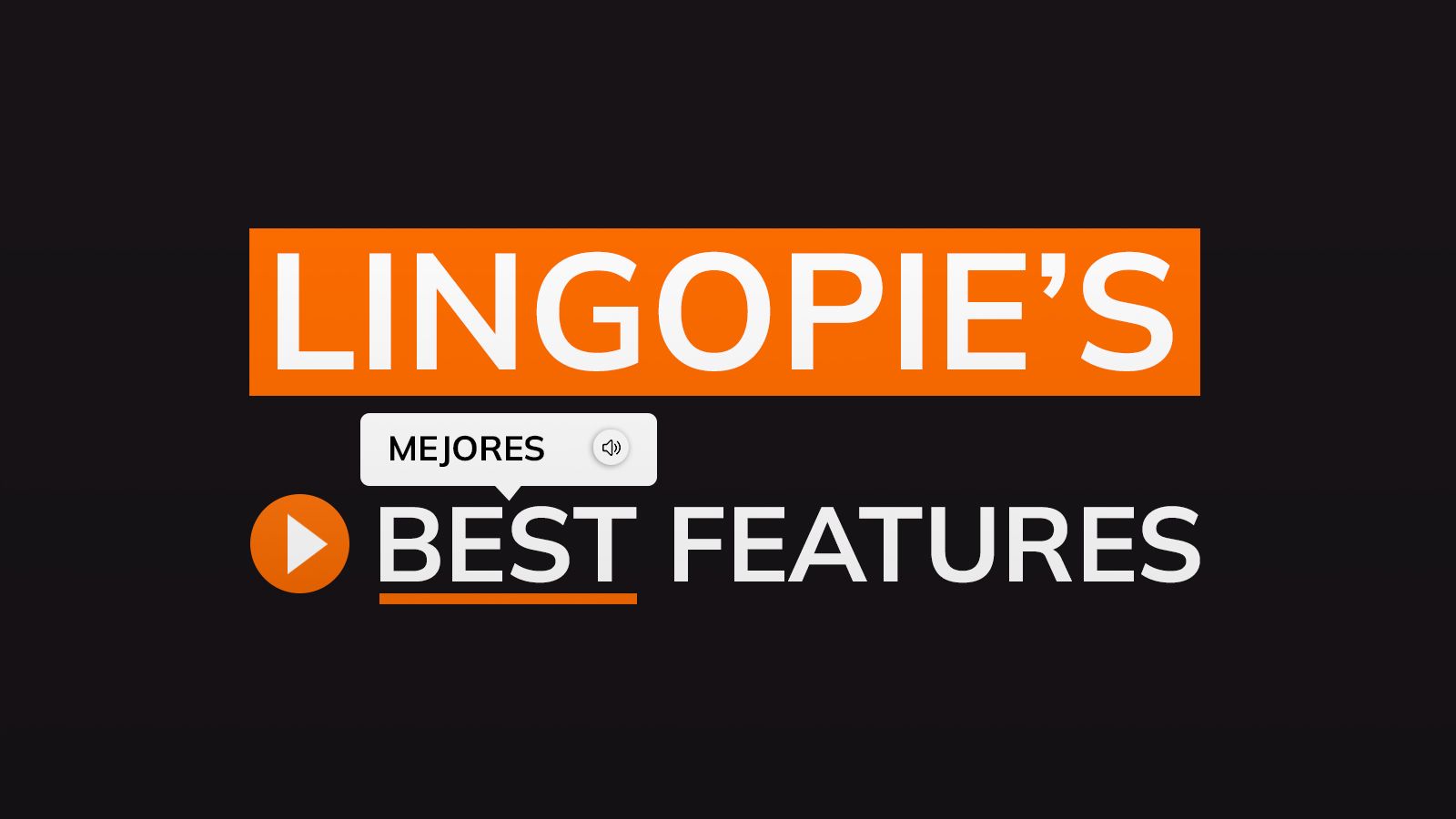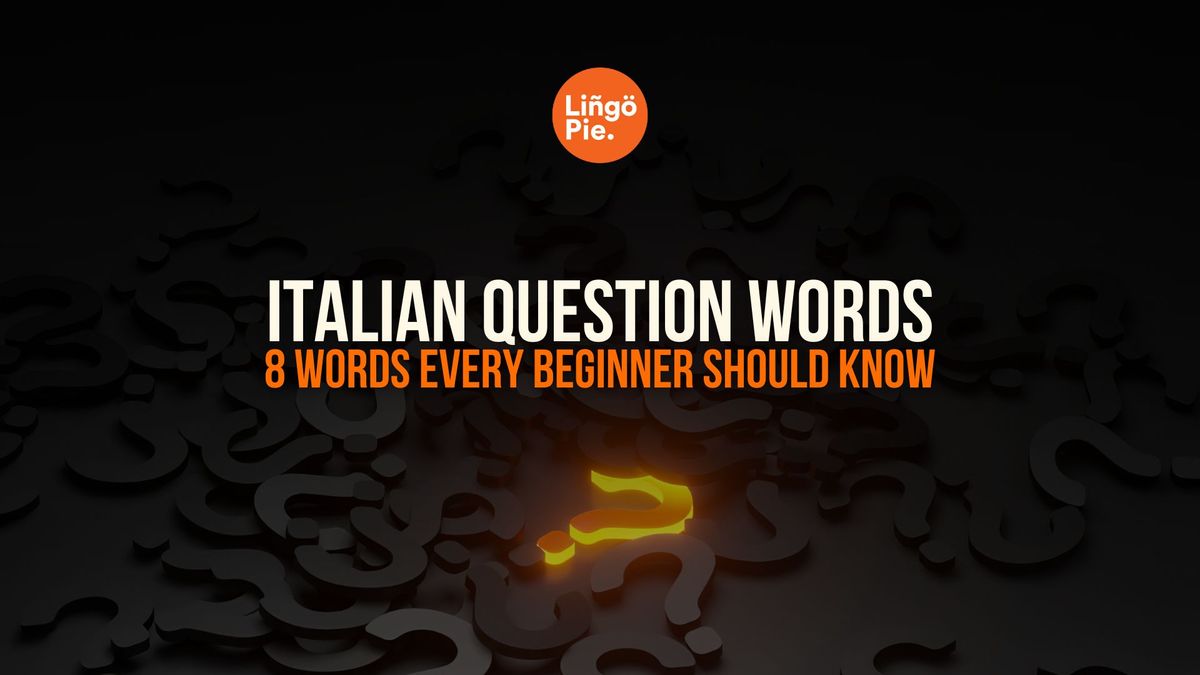I still remember the day I decided to learn Italian. Excitement coursed through my veins, quickly followed by a wave of anxiety. Where on earth do I start? The lists of conjugations, tenses, and vocabulary seemed endless. But here's a secret I wish someone had told me then: sometimes, the simplest things can be your biggest allies.
For me, that ally came in the form of Italian question words!
Trust me, I know it sounds basic. But these little nuggets of wisdom actually helped me when I visited Italy! They allowed me to ask for directions, clarify menu items, and even strike up conversations with locals – all while knowing just a handful of Italian words.
In this post, I'm sharing my personal cheat sheet with you: the 8 Italian question words that kickstarted my journey from confused tourist to confident speaker. Let's begin!

8 Basic Italian Question Words
In my journey to learn Italian, one piece of advice from tutors consistently stood out: master the question words first. Why? Well, They're short, simple, and incredibly powerful. With just these words, you can ask for directions, order food, or start a conversation.
The best part? They're single words, making them easy to remember and use immediately.
| Italian | English | Pronunciation |
|---|---|---|
| Chi | Who | kee |
| Che | What | keh |
| Quale | Which | kwah-leh |
| Dove | Where | doh-veh |
| Quando | When | kwahn-doh |
| Perché | Why | pehr-keh |
| Come | How | koh-meh |
| Quanto | How much/many | kwahn-toh |
Back when I was new to this, I remember creating this mnemonic to help me remember what the first letters are: Curious Cats Quietly Dance, Questioning People Coming Quickly! Pretty cool, eh?
Now, let's break down each of these words in detail. I'll show you how to use them effectively, provide some examples, and share tips I've picked up along the way.
Chi? - Who?
Chi (pronounced "kee") means "who" in Italian. Use it to ask about people in both singular and plural contexts. "Chi" can be the subject or object of a sentence and doesn't change form based on gender or number. It's often followed by the verb "essere" (to be) or other verbs in the third person.
Examples:
- Chi è quella donna? - Who is that woman?
- Chi ha preso il mio libro? - Who took my book?
- Con chi stai parlando? - Who are you talking to?
Chi can also be used in indirect questions: Non so chi verrà alla festa (I don’t know who will come to the party).
| Example Dialogue (Informal) | Example Dialogue (Formal) |
|---|---|
| A: Chi è lui? (Who is he?) B: È un mio amico. (He’s a friend of mine.) | A: Chi è il responsabile qui? (Who is the person in charge here?) B: Il signor Rossi è il responsabile. (Mr. Rossi is in charge.) |
Che? - What?
"Che" (pronounced "keh") primarily means "what" in questions. However, it's often used in conjunction with "cosa" (thing), forming "che cosa" to ask "what". This combination is important to understand:
- "Che" alone can mean "what": Che vuoi? (What do you want?)
- "Che cosa" together also means "what": Che cosa facciamo? (What are we doing?)
- In some regions, "cosa" alone is used for "what": Cosa hai detto? (What did you say?)
It's worth noting that before "è" (is), "cosa" becomes "cos'": Cos'è questo? (What's this?)
Examples:
- Che libro stai leggendo? - What book are you reading?
- Che cosa c'è per cena? - What's for dinner?
- Cosa pensi di questo? - What do you think about this?
The usage of "che", "che cosa", or "cosa" can vary by region, so you might hear different forms depending on where you are in Italy. In informal conversations, you can simply use Che? or Cosa?: Che fai? (What are you doing?)
| Example Dialogue (Informal) | Example Dialogue (Formal) |
|---|---|
| A: Che fai stasera? (What are you doing tonight?) B: Vado al cinema. (I’m going to the cinema.) | A: Che cosa desidera, signora? (What would you like, ma’am?) B: Vorrei un cappuccino, per favore. (I’d like a cappuccino, please.) |

Quale? - Which?
"Quale" (pronounced "kwah-leh") means "which" in Italian. Use it when asking someone to choose from a specific set of options. "Quale" can be singular or plural ("quali") and agrees in number with the noun it refers to. It's often used before nouns or with the verb "essere" (to be).
Examples:
- Quale vestito preferisci? - Which dress do you prefer?
- Quali ingredienti servono per la pizza? - Which ingredients are needed for the pizza?
- Quale di questi libri hai letto? - Which of these books have you read?
Remember, "quale" is used for more specific choices.
| Example Dialogue (Informal) | Example Dialogue (Formal) |
|---|---|
| A: Quale film preferisci? (Which movie do you prefer?) B: Preferisco quello d'azione. (I prefer the action one.) | A: Quale opzione consiglierebbe? (Which option would you recommend?) B: Le consiglio l’opzione più economica. (I recommend the more affordable option.) |
Dove? - Where?
"Dove" (pronounced "doh-veh") means "where" in Italian. Use it to ask about locations or directions. "Dove" doesn't change form regardless of the gender or number of the subject. It can be used at the beginning of a question or within a sentence and is often paired with prepositions to ask more specific questions about location.
Examples:
- Dove si trova il museo? - Where is the museum located?
- Da dove vieni? - Where are you from? (literally: From where do you come?)
- Dove andiamo stasera? - Where are we going tonight?
"Dove" can also be used in indirect questions and statements about location, not just in direct questions. It can also appear in more complex questions: Dove hai messo le chiavi? (Where did you put the keys?)
| Example Dialogue (Informal) | Example Dialogue (Formal) |
|---|---|
| A: Dove sei andato ieri? (Where did you go yesterday?) B: Sono andato al mare. (I went to the beach.) | A: Mi scusi, dove si trova la stazione? (Excuse me, where is the station?) B: La stazione è a sinistra. (The station is on the left.) |
Quando? - When?
"Quando" (pronounced "kwahn-doh") means "when" in Italian. Use it to ask about time - whether it's a specific moment, date, or general timeframe. "Quando" doesn't change form and can be used with any tense, depending on the context of your question. It's often used at the beginning of a sentence but can also appear in the middle of more complex questions.
Examples:
- Quando arriva il treno? - When does the train arrive?
- Da quando studi l'italiano? - Since when have you been studying Italian?
- Quando ci vediamo domani? - When will we see each other tomorrow?
"Quando" can also be used in indirect questions and temporal clauses, not just in direct questions about time. In more complex sentences, it can be used in both present and past contexts: Quando hai visitato Roma? (When did you visit Rome?)
| Example Dialogue (Informal) | Example Dialogue (Formal) |
|---|---|
| A: Quando torni a casa? (When are you coming home?) B: Torno domani mattina. (I’ll come back tomorrow morning.) | A: Quando è fissato il prossimo incontro? (When is the next meeting scheduled?) B: L'incontro è fissato per venerdì prossimo. (The meeting is scheduled for next Friday.) |

Perché? - Why?
"Perché" (pronounced "pehr-keh") means "why" in Italian. It's used to ask for reasons or explanations. "Perché" doesn't change form and can be used with any tense. It's typically placed at the beginning of a question, but can also appear mid-sentence in more complex structures.
Examples:
- Perché studi l'italiano? - Why are you studying Italian?
- Perché non vieni alla festa? - Why aren't you coming to the party?
- Mi puoi spiegare perché è successo? - Can you explain to me why it happened?
Interestingly, "perché" can also mean "because" when used in a response.
- Example: Perché studi italiano? (Why are you studying Italian?)
- Answer: Perché amo la cultura italiana (Because I love Italian culture).
| Example Dialogue (Informal) | Example Dialogue (Formal) |
|---|---|
| A: Perché sei in ritardo? (Why are you late?) B: C’era traffico. (There was traffic.) | A: Perché desidera cancellare la prenotazione? (Why would you like to cancel the reservation?) B: Per motivi personali. (For personal reasons.) |
Come? - How?
"Come" (pronounced "koh-meh") means "how" in Italian, but it's more versatile than its English counterpart. Use it to ask about the manner of actions, the state of things or people, and for descriptions. It's also used in greetings and exclamations.
Examples:
- Come stai? - How are you?
- Come si arriva al centro? - How do you get to the center?
- Come è il tuo nuovo lavoro? - What is your new job like?
It can also be used in more descriptive contexts: Come si fa la pasta? (How do you make pasta?)
| Example Dialogue (Informal) | Example Dialogue (Formal) |
|---|---|
| A: Come stai? (How are you?) B: Sto bene, grazie. (I’m good, thanks.) | A: Come si usa questo programma? (How do you use this program?) B: Deve prima accedere al menu principale. (You need to first access the main menu.) |
Quanto? - How much/many?
"Quanto" (pronounced "kwahn-toh") means "how much" or "how many" in Italian. It's used to ask about quantities or amounts. "Quanto" changes form to agree with the noun it modifies: "quanto" (masculine singular), "quanta" (feminine singular), "quanti" (masculine plural), and "quante" (feminine plural).
Examples:
- Quanto tempo ci vuole? - How much time does it take?
- Quanti anni hai? - How old are you? (Literally: How many years do you have?)
- Quante mele vuoi? - How many apples do you want?
It changes according to gender and number: Quante persone vengono? (How many people are coming?)
| Example Dialogue (Informal) | Example Dialogue (Formal) |
|---|---|
| A: Quanti anni hai? (How old are you?) B: Ho venticinque anni. (I’m 25 years old.) | A: Quanto costa questa borsa? (How much does this bag cost?) B: Costa cinquanta euro. (It costs 50 euros.) |
How to Form Basic Italian Question Words
Italian uses a Subject-Verb-Object (SVO) structure, but in questions, the structure is often flexible. For example:
- Statement: Tu mangi la pizza (You eat pizza).
- Question: Mangi la pizza? (Do you eat pizza?)
When using question words, they typically appear at the beginning:
- Dove sei andato ieri? (Where did you go yesterday?)
- Che cosa stai facendo? (What are you doing?)
In formal writing or speech, the use of inversion (Verb-Subject) is common. For instance:
- Hai visto il film? becomes Hai visto tu il film? (Have you seen the movie?)
Formal vs. Informal Questions
In formal situations, you may want to use Lei (the formal "you") and more polite expressions:
- Formal: Potrebbe dirmi dove si trova la stazione? (Could you tell me where the station is?)
- Informal: Dove si trova la stazione? (Where is the station?)
By understanding how these question words fit into different contexts and using them grammatically, you’ll become more effective in conversing and understanding Italian. Incorporating these into daily practice will help improve your fluency.
Regional Variations In Italian Question Words
Italy is known for its diversity of dialects, and question words can vary greatly depending on the region:
- In Rome and parts of southern Italy, people often shorten question words in casual speech. For example, instead of Che cosa fai? (What are you doing?), a Roman might simply say Che fai? or even 'Che stai a fa? with a distinct Roman accent.
- In Venice and parts of the Veneto region, you might hear Cossa instead of Cosa, as in Cossa ghe xe? (What’s there?).
Oh and another thing! Please remember that Italians take politeness seriously, and this extends to the way they ask questions. While in English, it might be acceptable to directly ask Where is the train station?, in Italian, adding politeness markers like scusi (excuse me) or per favore (please) is important:
- Dove si trova il bagno? (Where is the bathroom?) might sound too direct in some situations.
- A more polite way could be: Mi scusi, potrebbe indicarmi dov'è il bagno, per favore? (Excuse me, could you show me where the bathroom is, please?)
The Role of Idioms in Italian Questions
Italians use idiomatic expressions that incorporate question words in a way that isn’t always literal but reflects cultural attitudes. These expressions are a fun and engaging way to learn about Italian culture:
- Chi vivrà, vedrà – “Who lives, will see.” (Meaning: Time will tell.)
- Perché no? – "Why not?" This is a common phrase used when responding to a suggestion or idea.
By learning these phrases, language learners can gain deeper insight into how Italians communicate beyond formal grammar and vocabulary.
Test Your Knowledge: Italian Question Words Quiz
Ready to put your Italian question words to the test? Here's a quick quiz to check your understanding.
Read each English question or phrase and think about which Italian question word you would use to ask this in Italian. Write down your answers on a sheet of paper, then check them against the answer key provided below.
Don't worry if you don't get them all right the first time – learning a language is a journey, and every quiz is an opportunity to improve!
| # | English Question/Phrase | Your Answer |
|---|---|---|
| 1 | How much does this cost? | |
| 2 | When does the movie start? | |
| 3 | Where is the bathroom? | |
| 4 | Who is that woman? | |
| 5 | Why are you studying Italian? | |
| 6 | What time is it? | |
| 7 | How do you say "hello" in Italian? | |
| 8 | Which restaurant do you prefer? | |
| 9 | How many siblings do you have? | |
| 10 | What is your name? |
Answer Key
- Quanto
- Quando
- Dove
- Chi
- Perché
- Che
- Come
- Quale
- Quanti
- Come (or Qual è)
How did you do? Remember, practice makes perfect when learning a new language!
Learn Italian Question Words With Italian Films
As an Italian language enthusiast, I've found that watching Italian movies is an excellent way to improve my understanding of question words and everyday interactions in Italian. These films offer an authentic glimpse into Italian life and are filled with examples of question words used in various contexts.
Here are five of my favorite Italian movies available on Netflix:
- "La vita è bella" (Life is Beautiful, 1997) - This classic film showcases the use of "Che" and "Come" in both lighthearted and serious situations.
- "Perfetti sconosciuti" (Perfect Strangers, 2016) - I loved observing how "Chi" and "Perché" are used among friends in this modern comedy-drama.
- "Il postino" (The Postman, 1994) - This heartwarming movie helped me understand the use of "Quando" and "Dove" in poetic and everyday contexts.
- "Malèna" (2000) - Set in 1940s Sicily, this film beautifully demonstrates the use of "Quale" and "Quanto" in historical settings.
- "La grande bellezza" (The Great Beauty, 2013) - I was fascinated by how "Chi" and "Come" are used in sophisticated Roman social circles.
I highly recommend watching these movies in their original Italian with English or Italian subtitles. For an even more immersive learning experience, you can use Lingopie, a platform specially designed for language learning through TV series and movies.
📍13 Best Films on Netflix to Learn Italian [For Beginners]
📍Italian Intermediate Movies to Watch if You Are a Pro
📍The 10 Best Italian Series and TV Shows to Learn Italian
Learn Italian Question Words And More At Lingopie
Want to find the best pizza in Rome or figure out when the next train to Florence leaves? These words have got your back. They're the difference between being lost in translation and actually connecting with locals.
And hey, if you want to level up your Italian game, check out Lingopie. It's like Netflix, but for language learning. You get to watch cool Italian shows and pick up how real Italians use these questions. No textbook fluff, just practical, everyday Italian. Trust me, it's way more fun than staring at flashcards.

Give it a shot, and you might surprise yourself with how quickly you start sounding like a local.
FAQ
What are the Italian question words?
Italian question words, or interrogatives, include:
- Chi (Who?)
- Che/Cosa/Che cosa (What?)
- Dove (Where?)
- Quando (When?)
- Perché (Why?)
- Come (How?)
- Quanto (How much?/How many?)
These words help form basic questions and are crucial for everyday conversations in Italian.
How do you use Italian question words in a sentence?
Italian question words are typically placed at the beginning of a sentence, followed by the verb and subject. For example:
- Dove abiti? (Where do you live?)
- Che cosa fai? (What are you doing?) The word order can change slightly depending on the formality or complexity of the question.
How do you say 'Why' in Italian?
The word for "why" in Italian is Perché. It is used to ask for reasons or explanations, as in:
- Perché studi italiano? (Why are you studying Italian?) It also doubles as "because" when answering the question.
What is the difference between "Che," "Cosa," and "Che cosa" in Italian?
"Che," "Cosa," and "Che cosa" are interchangeable in most situations and all mean "What?" in Italian. However, "Che cosa" is slightly more formal and commonly used in written Italian, while "Che" or "Cosa" are more often used in spoken, informal contexts.
How do you say 'Who' in Italian?
The Italian word for "who" is Chi. It is used to inquire about people, such as:
- Chi è lui? (Who is he?) It can also appear in indirect questions: Non so chi verrà (I don’t know who will come).
What is the word for 'Where' in Italian?
The Italian word for "where" is Dove. It is used to ask about location:
- Dove vai? (Where are you going?) It can also be used in questions about events or objects: Dove sono le chiavi? (Where are the keys?)







![How Many Italian-Speaking Countries Are Out There? [2025 Data]](/blog/content/images/size/w300/2025/06/Italian-speaking-countries.jpg)


